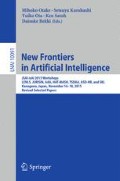Abstract
This paper formulates strong permission in prescriptive causal models. The key features of this formulation are that (a) strong permission is encoded in causal models in a way suitable for interaction with functional equations, (b) the logic is simpler and more straightforward than other formulations of strong permission such as those utilizing defeasible reasoning or linear logic, (c) when it is applied to the free choice permission problem, it avoids paradox formation in a satisfactory manner, and (d) it also handles the embedding of strong permission, e.g. in conditionals, by exploiting interventionist counterfactuals in causal models.
Access this chapter
Tax calculation will be finalised at checkout
Purchases are for personal use only
Notes
- 1.
By (AS), we infer \((p \wedge q) \rightarrow OK\) from \(p \rightarrow OK\). By (FCCE), it then follows that \(q \rightarrow OK\).
- 2.
Assume that modus ponens for the deontic reduction based on conditional \(\rightarrow \) is not defeasible, we show \(\lnot OK, p \models _{?} \lnot (p\rightarrow OK)\) to avoid inconsistency. Consider in some case that \(\lnot OK, p, p\rightarrow OK\) is consistent. If follows that \(\lnot OK\wedge OK\), which is inconsistent.
- 3.
In [3]: 11, \(\delta \) is understood as that all things are as required.
- 4.
[3] does not specifically address FCVI and FCCE. I suspect that, in linear logic, one might use the multiplicative operators (multiplicative conjunction \(\otimes \) and multiplicative disjunction
 , which have meanings close to the classical operators) to represent them, i.e.
, which have meanings close to the classical operators) to represent them, i.e.  for the invalidity of FCVI, and \((\varphi \otimes \psi )\multimap \delta \not \vdash \varphi \multimap \delta \) for the invalidity of FCCE.
for the invalidity of FCVI, and \((\varphi \otimes \psi )\multimap \delta \not \vdash \varphi \multimap \delta \) for the invalidity of FCCE. - 5.
See also the original proposal in [5]: 233–235.
- 6.
In Briggs (2012), this principle is originally stated as \(s \models \varphi \vee \psi \) if and only if \(s\models \varphi \), \(s\models \psi \), or \(s\models \varphi \wedge \psi \). It will become clear in Sect. 6 that the original one does not suit our purpose for modeling strong permission.
- 7.
It is natural to think that which door the guest opens and which door the car locates have causal effect on which door Monty Hall opens. For example, given the guests choose the door 1 and the car is located at door 2, Monty Hall will open door 3. This causal concern is usefor for revealing the probabilistic dependency among variables under concern. When we construct prescriptive causal models, we assume that Monty Hall, one of the agents involved in the situation, are free to violated causal determination relations.
References
Anderson, A.: The formal analysis of normative systems. In: Rescher, N. (ed.) The Logic of Decision and Action, pp. 147–213. University of Pittsburgh Press, Pittsburgh (1966)
Asher, N., Bonevac, D.: Free choice permission is strong permission. Synthese 145, 303–323 (2005)
Barker, C.: Free choice permission as resource-sensitive reasoning. Semant. Pragmatics 3, 1–38 (2010)
Briggs, R.: Interventionist counterfactuals. Philos. Stud. 160, 139–166 (2012)
Fine, K.: Counterfactuals without possible worlds. J. Philos. CIX, 221–246 (2012)
Pearl, J.: Causality: Models, Reasoning and Inference. Cambridge University Press, Cambridge (2000)
Author information
Authors and Affiliations
Corresponding author
Editor information
Editors and Affiliations
Rights and permissions
Copyright information
© 2017 Springer International Publishing AG
About this paper
Cite this paper
Wang, L. (2017). Strong Permission in Prescriptive Causal Models. In: Otake, M., Kurahashi, S., Ota, Y., Satoh, K., Bekki, D. (eds) New Frontiers in Artificial Intelligence. JSAI-isAI 2015. Lecture Notes in Computer Science(), vol 10091. Springer, Cham. https://doi.org/10.1007/978-3-319-50953-2_12
Download citation
DOI: https://doi.org/10.1007/978-3-319-50953-2_12
Published:
Publisher Name: Springer, Cham
Print ISBN: 978-3-319-50952-5
Online ISBN: 978-3-319-50953-2
eBook Packages: Computer ScienceComputer Science (R0)


 , which have meanings close to the classical operators) to represent them, i.e.
, which have meanings close to the classical operators) to represent them, i.e.  for the invalidity of FCVI, and
for the invalidity of FCVI, and